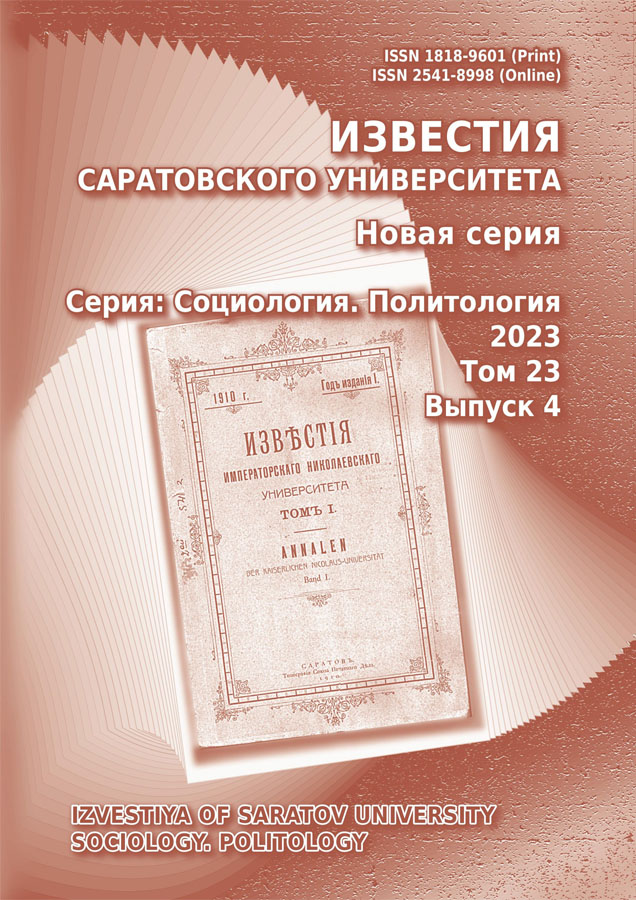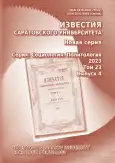Threats to human security in Latin America
- Authors: Smirnova A.S.1,2
-
Affiliations:
- Military University named after Prince Alexander Nevsky of the Ministry of Defense of the Russian Federation
- Moscow State Linguistic University
- Issue: Vol 23, No 4 (2023)
- Pages: 467-473
- Section: New Voices: Young Political Scientists’ Research
- URL: https://journal-vniispk.ru/1818-9601/article/view/251575
- DOI: https://doi.org/10.18500/1818-9601-2023-23-4-467-473
- EDN: https://elibrary.ru/OLHGKD
- ID: 251575
Cite item
Full Text
Abstract
Like any other region of the world Latin America is a subject to threats that negatively affect the standard of living of people. The author identifi es and analyzes the main economic, social, political, and environmental threats of the region, referring to the documents of international organizations such as the UN, the World Bank, Human Rights Watch and experts studying the problems. The author notes that the immediate economic threat to human security arises from a drop in production, loss of income and rising unemployment, which leads to a signifi cant increase in poverty and a decrease in citizens’ confi dence in the future. Against the backdrop of global crises, the World Bank forecasts a modest increase in the GDP of countries in the coming years. The author identifi es three social groups that are most vulnerable to threats to human security: migrants, indigenous people, women, and children. A common problem for the region is the high percentage of cases of violence that also come from the authorities. The main threat to the political security of citizens is the weakness of democracies, since this political system in the region has existed for about forty years and is not yet as developed as in other regions of the world. The high level of corruption among offi cials aggravates the situation in the country, which often leads to rallies and strikes throughout the region. Among the transnational threats to human security, the author notes terrorism and organized crime, including money laundering and drug traffi cking, as well as traffi cking in short-barreled weapons. These threats pose a direct danger to people’s lives. Against the background of deforestation of tropical forests, the threat to environmental security is extremely acute. The danger is that deforestation leads to the deprivation of indigenous peoples of their habitat, which directly aff ects the human security of the region.
About the authors
Anastasia S. Smirnova
Military University named after Prince Alexander Nevsky of the Ministry of Defense of the Russian Federation; Moscow State Linguistic University
Author for correspondence.
Email: smirnova.nastya.2021@bk.ru
ORCID iD: 0009-0003-6857-7156
14 Bolshaya Sadovaya St., Moscow 123001, Russia
References
- Banco Mundial, Perspectivas económicas mundiales: América Latina y el Caribe, Enero de 2023. URL: https://thedocs.worldbank.org/en/doc/c7292ee84f0635b28721419e3b367d0e-0350012023/related/GEPJanuary-2023-Regional-Highlights-LAC-SP.pdf (дата обращения: 26.02.2023).
- Noticias ONY, El desempleoen América Latina bajaráen 2022, aunqueseguirámás alto que antes de la pandemia. URL: https://news.un.org/es/story/2022/01/1502672 (дата обращения: 27.02.2023).
- Desempleo impacta más en las mujeres en Latinoamérica, según la OIT // teleSurTV.net. URL: https://www.telesurtv.net/news/desempleo-america-latinamujeres-oit-20220202-0006.html (дата обращения: 27.02.2023).
- Acuña-Alfaro J., Khoudour D. El potencial de la migración en América Latina y el Caribe, 2020. URL: https://www.undp.org/es/blog/el-potencial-de-lamigracion-en-america-latina-y-el-caribe (дата обращения: 24.02.2023).
- Global Report on Traffi cking in Persons 2018. URL: https://www.unodc.org/documents/data-and-analysis/ glotip/2018/GLOTiP_2018_BOOK_web_small.pdf (дата обращения: 27.02.2023).
- Morales J. A. Trata de personas: el mal ejemplo de Latinoamérica, 2019. URL: https://www.dw.com/es/trata-depersonas-el-mal-ejemplo-de-latinoamérica/a-49815476 (дата обращения: 25.02.2023).
- Naciones Unidas, UNdata, 2021. URL: https://data. un.org/DocumentData.aspx?q=homicide&id=432 (дата обращения: 24.02.2023).
- Human Rights Watch, Report 2022. URL: https://www. hrw.org/worldreport/2022.pdf (дата обращения: 25.02.2023).
- Transparency International, Corruption Perceptions Index, 2021. URL: https://www.transparency.org/en/ cpi/2021 (дата обращения: 27.02.2023).
- Esparza D. P., Ricart C. A. P., Vargas E. W. Gun Traffi cking and Violence: From The Global Network to The Local Security Challenge. Cham : Springer Nature Switzerland, 2021. 314 p. http://dx.doi.org/10.1007/978- 3-030-65636-2
- Wiesse M., Goldman L. La Destrucción de los Bosques PrimariosAumentó un 12% de 2019 a 2020. 2021. URL: https://www.globalforestwatch.org/blog/es/data-andresearch/datos-globales-de-perdida-de-cobertura-arborea-2020/ (дата обращения: 27.02.2023).
- Goals to Transform Our World. URL: https://www. un.org/sustainabledevelopment/ru/about/developmentagenda/ (дата обращения: 25.02.2023).
Supplementary files










